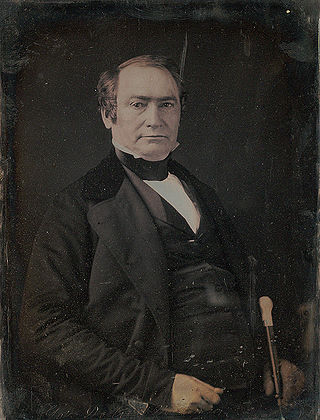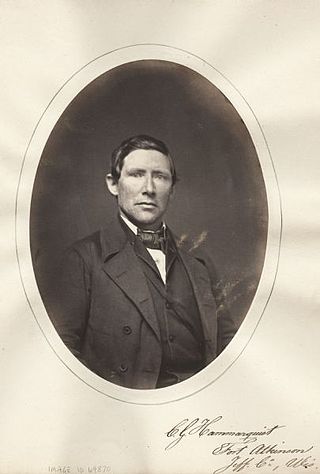Related Research Articles

The Territory of Wisconsin was an organized and incorporated territory of the United States that existed from July 3, 1836, until May 29, 1848, when an eastern portion of the territory was admitted to the Union as the State of Wisconsin. Belmont was initially chosen as the capital of the territory. In 1837, the territorial legislature met in Burlington, just north of the Skunk River on the Mississippi, which became part of the Iowa Territory in 1838. In that year, 1838, the territorial capital of Wisconsin was moved to Madison.

James Duane Doty was a land speculator and politician in the United States who played an important role in the development of Wisconsin and Utah Territory.

The 1847 New York state election was held on November 2, 1847, to elect the lieutenant governor, the secretary state, the state comptroller, the attorney general, the state treasurer, the state engineer, three Canal Commissioners and three Inspectors of State Prisons, as well as all members of the New York State Assembly and the New York State Senate.
The 4th Senate district of Wisconsin is one of 33 districts in the Wisconsin Senate. Located in southeast Wisconsin, the district is entirely contained within northern Milwaukee County. It comprises part of the north side of the city of Milwaukee, as well as the city of Glendale, the village of Shorewood, and parts of northern Wauwatosa and western Brown Deer. The 4th Senate district is one of two majority-black Senate districts in Wisconsin.
Cornelius Coughlin was an American farmer from West Bend, Wisconsin who served one term as an Independent Greenback member of the Wisconsin State Assembly from Washington County.
Parker Warren was an American farmer from Beaver Dam, Wisconsin who served a one-year term in 1849 as a Free Soil Party member of the Wisconsin State Assembly from Dodge County.
Joseph Spaulding was an American farmer from Rock County, Wisconsin, who spent two one-year terms as a member of the Wisconsin State Assembly from Rock County, first as a Freesoiler and later as a Republican.

Charles G. Hammarquist was an American farmer, merchant and postmaster from Busseyville, Wisconsin, who served in the Wisconsin State Assembly.
Adam E. Ray was an American farmer politician from Troy, Wisconsin who served several terms in the Legislature of Wisconsin Territory, and a single term in 1851 as a Free Soil Party member of the Wisconsin State Assembly from Walworth County.
Samuel Pratt was an American farmer, Republican politician, and Wisconsin pioneer. He was an early settler at Spring Prairie, Wisconsin, and represented his region in the Wisconsin State Assembly and State Senate for nine sessions between 1849 and 1874.
Socrates Nelson was an American businessman, politician, and pioneer who served one term as a Minnesota State Senator from 1859 to 1861. He was a general store owner, lumberman, and real estate speculator and was associated with numerous companies in the insurance and rail industries. He was involved in the establishment of the community of Stillwater, Minnesota and was an early member of the first Independent Order of Odd Fellows lodge in Minnesota. He served on the University of Minnesota's first board of regents before being elected to the Minnesota Senate.
Benjamin Hunkins was an American politician who had a role in shaping the Wisconsin constitution.

Benjamin Ferguson was a Scottish American politician and farmer. He was one of the first settlers of Fox Lake, Wisconsin, and served a single two-year term (1860–61) representing Dodge County in the Wisconsin State Senate.
Charles Beckman was an American farmer and politician from Watertown, Wisconsin, who held a number of public offices, from mayor to member of the Wisconsin State Assembly.
William Caldwell was an American shopkeeper from Barton, Wisconsin, who served a single one-year term as a Whig member of the Wisconsin State Assembly in the 1st Wisconsin Legislature. He was the only Whig among the five Assemblymen from Washington County.
Eliphalet Steele Miner was an American merchant, Republican politician, and Wisconsin pioneer. He was the first American settler at Necedah, Wisconsin, and represented Juneau County for four years in the Wisconsin Legislature. He was also the first county judge of Adams County, Wisconsin, despite not having a legal background. In historical documents, his name is frequently abbreviated as E. S. Miner.
William H. Johnson was an American politician and farmer from Fort Atkinson, Wisconsin who spent a single one-year term as a Democratic member of the Wisconsin State Assembly from Jefferson County during the 1849 session, succeeding fellow Democrat Ninian E. Whiteside.

The 1869 Wisconsin gubernatorial election was held on November 2, 1869. Incumbent Republican Party governor Lucius Fairchild won re-election with over 53% of the vote, defeating Democratic candidate Charles D. Robinson. Fairchild became the first person to win three terms as governor of Wisconsin.
James Fagan was an Irish American immigrant, farmer, and Wisconsin pioneer. He was a member of the Wisconsin State Assembly, representing Washington County during the 1849 and 1857 sessions. He earlier served as a delegate to Wisconsin's second constitutional convention, which produced the Constitution of Wisconsin.

The Fifth Legislative Assembly of the Wisconsin Territory convened from January 4, 1847, to February 11, 1847, and from February 7, 1848, to March 13, 1848, in regular session. The Assembly also convened in special session from October 18, 1847, to October 27, 1847, to organize a second constitutional convention after the failure to adopt the first Wisconsin Constitution.
References
- ↑ History of Washington and Ozaukee Counties, Wisconsin: Containing an Account of Its Settlement, Growth, Development and Resources ... Biographical Sketches, Portraits of Prominent Men and Early Settlers; the Whole Preceded by a History of Wisconsin ... and an Abstract of Its Laws and Constitution Chicago: Western Historical Company, 1881; p. 321
- ↑ Turner, A. J., ed. The legislative manual of the state of Wisconsin: comprising the constitutions of the United States and of the state of Wisconsin, Jefferson's manual, forms and laws for the regulation of business; also, lists and tables for reference, etc. Thirteenth Annual Edition. Madison: Atwood and Culver, Printers and Stereotypers, 1874; pp. 148-150
- ↑ State of Wisconsin Legislative Reference Bureau. "Members of the Wisconsin Legislature 1848–1999". Information Bulletin 99-1 (September 1999), p. 93.
- ↑ Fox, Edgar B.; Dudley, W. T. History and directory of Green Lake and Waushara Counties, and the city of Ripon, containing historical sketches of the counties cities and principal villages, alphabetical lists of firms and individuals engaged in business, a complete classified business directory, lists of first and present county and city officers, present town officers, churches, schools, organizations, etc., etc., etc. Berlin, Wisconsin: Courant Book and Job Office, 1869; p. 15
- ↑ Harvey, Louis P., et al. "Annual report of the secretary of state, for the fiscal year ending Sept. 30, 1861," in, Annual message of the governor of Wisconsin, and reports of the state departments, for the fiscal year ending Sept, 30th, 1861[Covers 1860/1861]. Madison: Smith and Cullaton, 1861; p. 291
- ↑ Findagrave bio